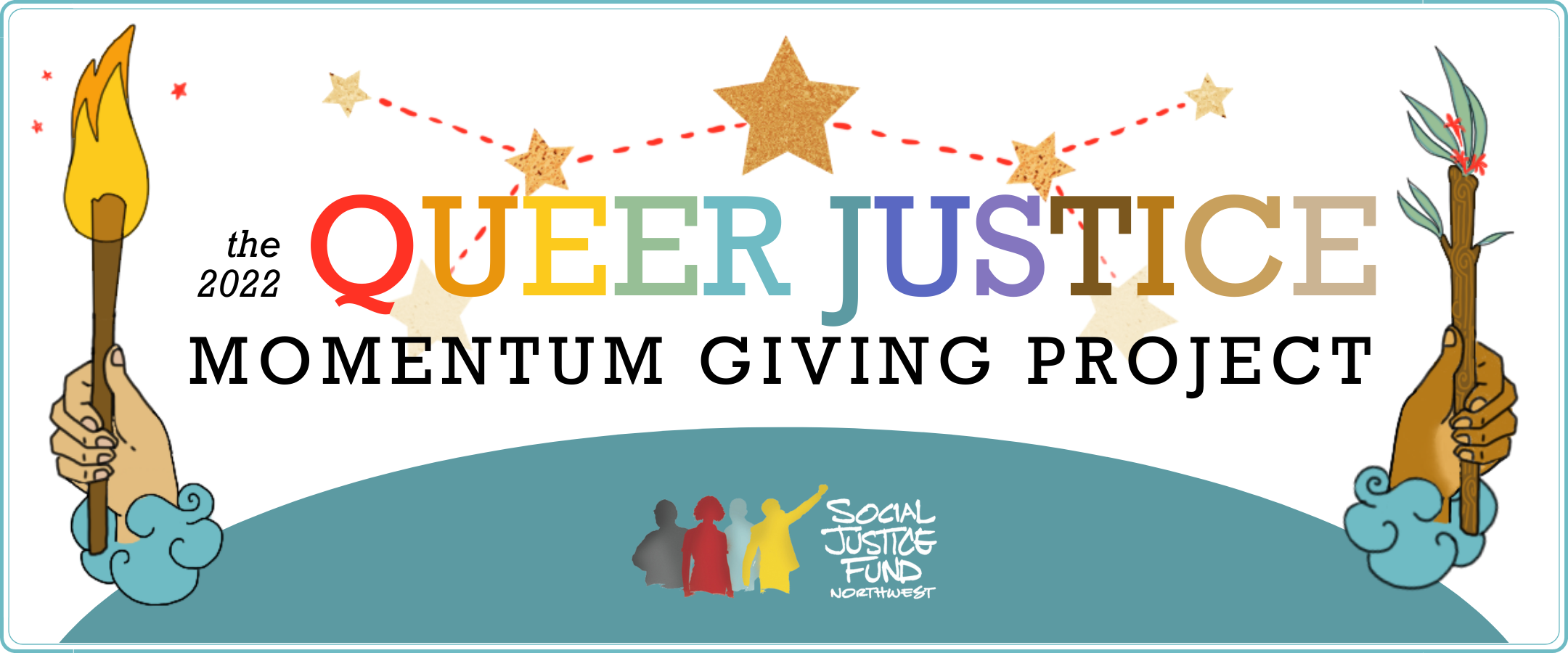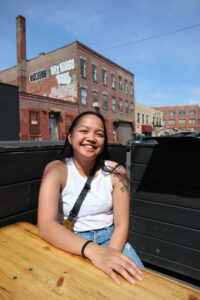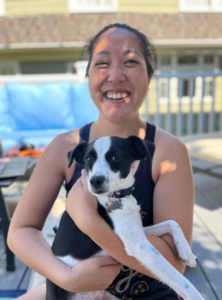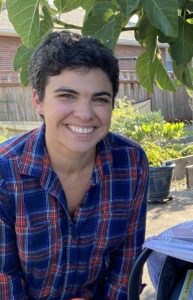
News + Events

There are few things more sacred than a small collective of people putting their hearts and minds together to change something for the better with love, fierceness, and dedication. We saw this magic in action in the Queer Justice Momentum Giving Project cohort, an almost entirely queer collective of donor organizers who, over the course of four months in 2022, gathered together virtually to learn, build community, and mobilize resources for grassroots, LGBTQIA+ led organizing in our region.
We awarded an incredible $440,000 for the Queer Justice Momentum Giving Project grants, exceeding the original goal of $150,000! Momentum Giving Projects are made up of alumni and are smaller in number and shorter in length than regular Giving Projects. As alumni ourselves, Andriana Alexis and Mercedes Klein (the project’s facilitators) wanted to tap into the abundance of our network, strengthening the web of connection between GP alumni both inside and outside of this project. Cohort members intentionally (re)connected with alumni who weren’t able to join the project but still wanted to give. We also saw an outpouring of support from the SJF community at large! There was a bright gold thread woven throughout, spun from queer magic, connecting each of us and stitching together a project that will live in our memory as something truly special.
We asked three cohort members about their experience. Here’s what they had to say:
 Hunter Blas, cohort member
Hunter Blas, cohort member
I joined the Momentum Giving Project because I was really craving the type of community I was able to create the last time I participated in a Giving Project over 4 years ago. I also felt compelled due to the theme of the project, which was queer justice and providing funding to protect queer and trans people to live the life they wanted. I also wanted to donor-organize my own community, in particular my closest friends, and share with them the unique SJF model. Fundraising my community was amazing, I shared the importance of moving resources to queer justice during this particularly grave moment of political and legislative attacks on queer and most notably, trans people.
As our project progressed, our facilitators Andriana and Mercedes did an excellent job creating a space full of ease, abundance, and magic. They both created a grounding experience that centered the reasons we were doing this and allowed us to be visionary as a collective of what we hoped moving these resources would do for our community. Compared to my last giving project, our much smaller cohort allowed for more intimacy and feeling of a collective that felt really imaginative. As a group we tried to really hone in on organizations that we found to be experimental, or working in the margins, with a particular lens on abolitionist principles happening in the PNW. We pledged to choose organizations that were Black and Indigenous and queer or trans led. We were able to accomplish that with two grantees I am personally excited and inspired by: UTOPIA WA and Lavender Rights Project, since they serve the Pacific Islander community and areas in the suburbs of Seattle (where I am from).
I would tell anyone considering joining a giving project to do it, it will provide an amazing community with visionary optimism for the world we deserve. It also gives a real moment of reflection on your role in creating a radically just future and how giving our resources (and our community’s) are one piece of the puzzle in creating it.

Emily Chu, cohort member
It was such a gift to be able to join a Momentum Giving Project and to be in community again with people who believe in and want to support crucial community organizing led by those most impacted that has sustained ongoing struggles for justice for years and decades. While I was nervous about doing the GP over Zoom I shouldn’t have been. Andriana and Mercedes were incredible facilitators, purposeful and conscientious at every turn, helping me feel deeply and meaningfully connected to people I’ve still never met in person. I got to see how much I’ve changed and learned since my last GP experience in 2017 and how much I can keep growing and learning from here, and in a time of particular isolation and fear due to the ongoing pandemic, I made a kind of home with people who shared my values and pushed me in loving ways to be sharper and more honest in my reckoning with my positionality as a wealthy, cis, queer, East Asian woman in relation to the work of moving money. That ecosystem of care grounded and empowered me as I made the largest meaningful gift I’ve ever made and fundraised far more than I expected to from my communities during the months leading up to an election. I learned more about transformative justice and abolition from our amazing guest speakers, and I was so proud to center Black liberation and Indigenous sovereignty in our grantmaking. I cannot recommend this experience more highly to other GP alums.
 Emily Mirra
Emily Mirra
The opportunity to join the Queer Justice Momentum Giving Project was a timely one. More than two and a half years into the pandemic, I was feeling increasingly disconnected from and not very hopeful about the world, nor my place in it to contribute meaningfully. It has also been a particularly frightening time for queer communities, who are facing ever growing political and personal violence. I had recalled how connecting and transformational my first Giving Project was, back in 2017. It changed my understanding of philanthropy and challenged me to consider why so many of us get so weird talking about money! The chance to work together with fellow queers and accomplices to raise funds from our communities and move resources to organizations doing life-saving and community-building work across the NW was just right for this moment.
The Momentum GP, with its condensed timeline, felt more like a sprint than a marathon. We moved quickly from orienting to the topic to starting our fundraising to reading grant applications. I was especially appreciative that our group, with the guidance of our facilitators, made it a priority to find ease, joy, creativity, and connection in each of our meetings and our work together generally. That was a different focus than I remember from the first giving project. Each meeting we played silly games, took deep breaths together, moved our bodies to Beyonce, gushed about our favorite queer icons, and understood all these things as instrumental to the urgent, complex, and draining work we were doing together.
In the end, our group surpassed our fundraising goals twice and were able to fund 11 organizations. So much more ended up being possible than I initially thought. I was particularly inspired by the care and intention that our group brought to the decision-making process. Although we were unable to fund every organization that applied, we found a way to honor each org’s application and share our hope that they have what they need to thrive.
We honor the grantees!
The awardees of this project, chosen by the cohort through consensus, embody all of this magic and more. They are oracles, healers, and visionaries, revolutionaries, shapeshifters, and stewards. We could not be more honored to resource their alchemy. We encourage all our community to connect with the grantees and support their work by donating directly!
Beyond These Walls | Portland, OR
Beyond These Walls works to achieve justice and liberation for LGBTQIA2S+ people incarcerated in the Pacific Northwest and the world through advocacy, service, and organizing. They provide direct services for people in prison and reentry services for people returning to the community; they engage in advocacy and organizing at both the institutional and grassroots level; and they focus on building community inside of prisons through groups, clubs, and training.
Disability Justice Dreaming | Portland, OR
Disability Justice Dreaming is an inter/national space by and for Disabled LGBTQ2SIA+ people, sex workers and trafficking survivors, and Black, Indigenous, multiracial, and other People of Color to develop leadership capacities, create and display/perform interdisciplinary art, transmit Disabled culture, collaborate with and support other groups/organizations with similar values and goals, build community, and more through a Disability Justice lens. From their beds and their ventilators, they think generationally and work for liberation and a re-indigenized world.
EmpowerMT | Missoula, MT
EmpowerMT’s mission is to create a more just and inclusive society by developing youth and adult leaders who work to end mistreatment, correct systemic inequalities and strengthen communities across Montana. Rather than focusing exclusively on a single issue, they approach all forms of oppression through a lens of intersectionality, recognizing the importance of inclusion across group lines. Their youth continue to advocate on the issues impacting LGBTQ+ lives including the defeat of several anti-trans bathroom bill proposals in 2017 and 2018.
Lavender Rights Project | Tacoma, WA
Lavender Rights Project (LRP) elevates the power, autonomy, and leadership of the Black intersex and gender diverse community through intersectional legal and social services. They utilize the law as an organizing principle to affirm the civil rights and self-determination of Black intersex and gender diverse people. Their twofold goal is to end the epidemic of deadly violence against Black trans women and femmes (who are the most vulnerable of the LGBTQ+ community in the United States) and to create stronger, infallible protections for Black gender diverse communities on the city, county, and state levels. These goals guide their approach towards housing and economic justice and ending gender-based violence—all of which are intrinsically tied to the protection of Black trans life.
Liberation Medicine School | Seattle, WA
Liberation Medicine School (LMS) is an emerging African-Indigenous, decolonial, and Black Trans health system that fosters medical and educational sovereignty within the diasporic Afro-LGBTQI community. LMS was birthed by a Black Trans healer in protest of colonial medical practices that harm Black folks. They aim to achieve their mission of medical autonomy by building an ecosystem of wellness that is nourished by a School of Medicine that centers the medical knowledge/experiences of the Black Trans community, is rooted in a landed village where Black Trans folks have access to safe housing, sustainably grown food, economic self-sufficiency, and social support, houses a tribe of interdependent Black Trans healers who teach, share, and practice with each other and with community life-giving medicines, and celebrates the role of Black TGNC people in anchoring indigenous medicines.
NativeWomanshare | Grants Pass, OR
NativeWomanshare is created BY and designed FOR Indigenous women, Two-Spirit/Trans and QBIPOC community of rural Southern Oregon and seeks to first serve these marginalized communities who do not usually experience real safety and support in most other local spaces. They offer community space for 2SQT+BIPOC to gather, Food Sovereignty Farm and model for Indigenous Land Stewardship to remediate the land for ongoing fire relief. NativeWomanshare serves short to long-term emergency housing, fresh produce deliveries from the farm, and essential goods as needed. Their long vision supports Queer, Native and BIPOC wellness, visibility and healing on land.
Queer the Land | Seattle, WA
Queer the Land’s (QTL’s) mission is to directly address the root causes and power structures that are displacing their communities and destabilizing their people’s organizing work. They are driven by their lived experience of the housing crisis and economic displacement in Seattle as members of queer, transgender, and Two-Spirit Black/Indigenous/people of color (QT2BIPOC) communities. They work tirelessly to build a future themselves as the members of the communities most impacted by engaging people and actively working together to keep QTL community spaces running and thriving. In QTL’s fantastical future their members don’t wonder how they’re going to afford rent increases each year, they can spend time taking action to strengthen their communities.
Rogue Action Center | Phoenix, OR
The Rogue Action Center (RAC) builds organizing infrastructure, leaders, and community power for a just, inclusive, and sustainable Southern Oregon for everyone. The RAC’s LGBTQ+ Listening Project will continue their efforts to address gaps in queer, grassroots organizing by building systems and infrastructure that empower local leaders and incite change on the local and regional level, in order to create a more equitable, just, and thriving queer community in Jackson and Josephine counties. By listening to and building power within their communities, the LGBTQ+ Listening Project is on the forefront of supporting queer communities and filling a critical role of advocacy, organizing capacity, and infrastructural support across their rural communities.
Spectrum Center Spokane | Spokane, WA
Spectrum’s mission is to create a safe, intersectional, intergenerational, LGBTQIA2S+ community gathering space that celebrates a resilient, healthy community through social connectedness and support, arts and culture, access to resources, and leadership development. The long term vision is for Spectrum to be the primary change agent for the LGBTQIA2S+ community by advocating for social progress in Eastern Washington. They support a thriving and diverse population through education, social events, services, social activism, visibility, and by uplifting and collaborating with other organizations.
Surge Reproductive Justice | Seattle, WA
Surge Reproductive Justice (SRJ) mobilizes communities to build a world where all people can make powerful, self-determined choices for their bodies and the future of their families and communities. Our work centers Black women, women of color, and queer and trans people of color for a movement that rises from the bottom up.
U.T.O.P.I.A. Washington | Kent, WA
The mission of UTOPIA (United Territories of Pacific Islanders’ Alliance) WA is to provide sacred spaces to strengthen the minds and bodies of Queer and Trans Pacific Islanders (QTPI or “Q-T-pie”) through community organizing, community care, civic engagement, and cultural stewardship. UTOPIA was born out of the struggles, challenges, strength, and resilience of the Pacific Islander LGBTQI community in the Northwest. UTOPIA is led and founded by women of color who identify as transgender and/or Fa’afafine, a cultural gender identity native to Samoa translated as “in the manner of a woman.” They provide frontline support and advocacy to people for whom race, and gender identification have resulted in discrimination, harassment, severely limited opportunities, and criminalization because of involvement in the sex trades. They envision a world of cultural wealth, dignity, healing, and liberation for QTPIs that honors their ancestors and supports future generations and themselves.